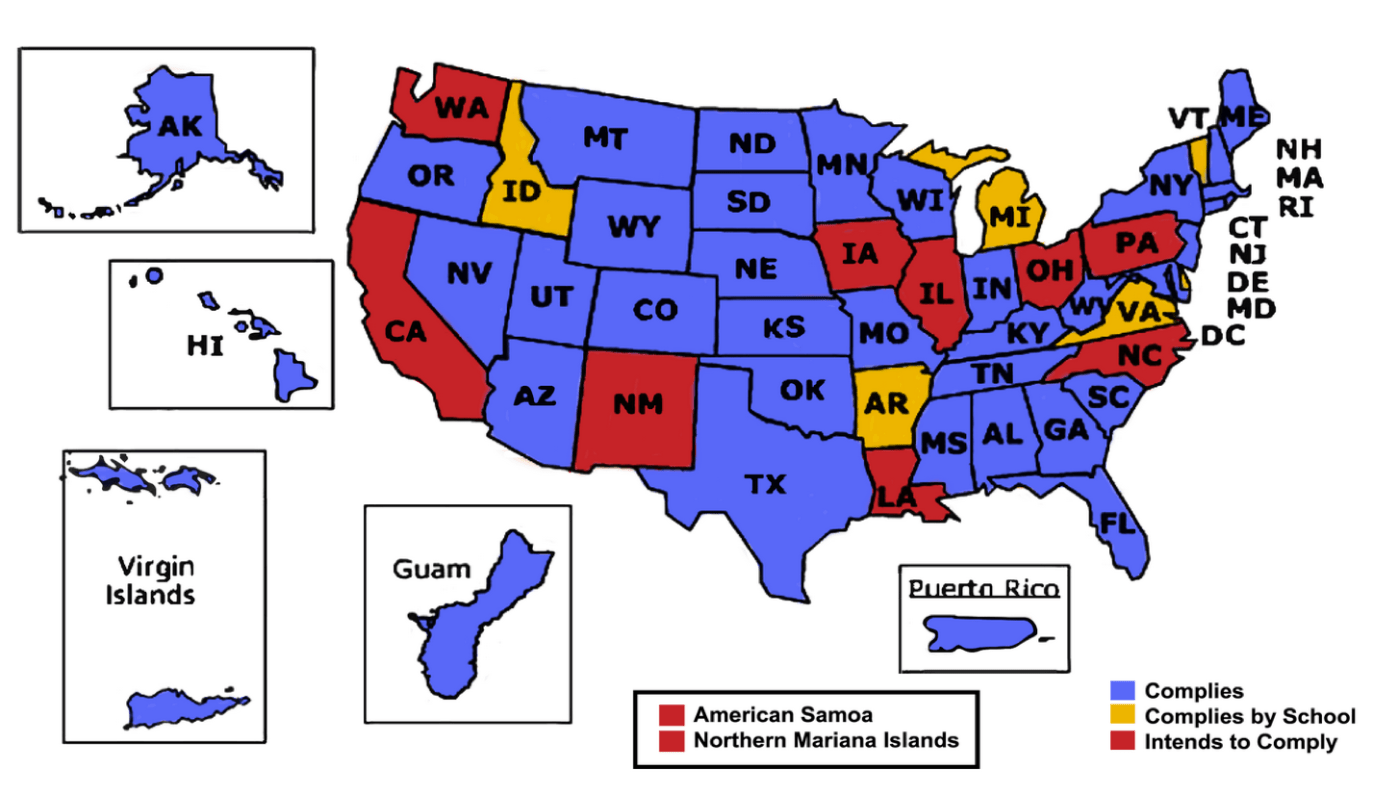Starting July 1, resident-rate tuition and fees (section 702) will be offered to “covered individuals” in qualifying states/territories. Currently, 34 states and 3 territories comply with the law.
A covered individual is defined in the Choice Act as:
- A Veteran who lives in the state where the Institution of Higher Learning (IHL) is located (regardless of his/her formal state of residence) and enrolls in the school within three years of discharge from a period of active duty service of 90 days or more.
- A spouse or child using transferred benefits who lives in the state where the IHL is located (regardless of his/her formal state of residence) and enrolls in the school within three years of the transferor’s discharge from a period of active duty service of 90 days or more.
- A spouse or child using benefits under the Marine Gunnery Sergeant John David Fry Scholarship who lives in the state where the IHL is located (regardless of his/her formal state of residence) and enrolls in the school within three years of the Servicemember’s death in the line of duty following a period of active duty service of 90 days or more.

The state/territory meets the statutory requirements as determined by VA. Covered individuals using the Post-9/11 GI Bill or Montgomery GI Bill – Active Duty at public IHLs will be charged the resident rate for tuition and fees for terms beginning after July 1.
What does it mean if my school/state doesn’t comply yet?
VA recognizes that many schools/states are challenged to achieve compliance due to state legislative and/or policy changes required. To assist the school/state, the Secretary of Veterans Affairs is using his authority to waive the provisions of Section 702 of the Choice Act for all terms beginning prior to Jan. 1, 2016. This will allow the states and schools not already in compliance by July 2, 2015, additional time to make the necessary changes and ensure GI Bill students may continue their education and training at their chosen institutions.
Please note: Be sure to check our website for an up-to-date status of your school/state!
What does it mean if my school complies?
The state/territory governing body delegated the decision to the public IHL. The list of schools that comply does not include every public IHL in the respective state/territory, but only those that have agreed to charge covered individuals the resident rate for tuition and fees for terms beginning after July 1, 2015.
To see if your school/state is in compliance, visit http://www.benefits.va.gov/gibill/702.asp
Topics in this story
More Stories
In this news post, we explore the various options designed to keep you in your home, offering hope and possible solutions for when/if you experience financial hardship.
Vietnam Veteran David Chee is among the many Native American Veterans and service members who have dedicated their lives to military service. Chee proudly served with the Army's 82nd Airborne, parachuting into the jungles of Vietnam. Chee now owns a home he purchased on Navajo tribal lands with the help of the VA Native American Direct Loan.
For Veterans, donating to charities—especially those that support fellow service members—feels like a meaningful way to give back to the community. However, Veterans and their loved ones must remain vigilant and learn to protect themselves from charity scams.







A lot of veterans are now taking advantage of their GI bills in the aviation realm. For those readers interested in in-state tuition, and enjoy the thought of flying, you should really look into getting your pilots license. It’s a great new incentive for the GI bill and could make a dream for someone do-able.
Cpt. 33 would have been great if ONLY the Army had told my husband that he could have transferred his benefits before he medically retired out. He is at 80% so Chp. 35 is out. He would have loved to transfer his Ed benefits to our 17 year old who graduates next year. No one told him about this so now what do we do? This is a real problem the Army has – not telling you!
I am retired vet of 32 years, 4 active duty,1 deployment, 27 USAR. I have kids who are and will be in college. What program do I have to get them through.
George– All of the VA’s education programs, including their eligibility characteristics, are available at http://www.benefits.va.gov/gibill/education_programs.asp for your consideration.
If I had to guess, and I do, I would say that your children could only be potentially eligible for one of two different chapters, Chapter 33 or Chapter 35. Chapter 33 is the Post 9/11 GI Bill. In order for them to be eligible for that benefit through your service you would have had to transfer some of that benefit to them while you were serving. Chapter 35 is the Survivor’s and Dependent’s Educational Assistance Program. In order for your children to become eligible for that program you would have to have a 100% disability rating through VA.
There is a lot that goes into the determination of eligibility. If you’re unsure about your eligibility, your best option is always to speak with an education benefits advisor. VA’s education hotline is 1-800-GIBILL-1 (442-4551). Have your DD214 or your dates of service handy as that will help the advisor determine your eligibility. I hope this helps!
Here in New Jersey, most of our two-year schools, community colleges, do not charge “in-state tuition.” Instead, they charge, “in-county tuition.” Usually, the out-of-county rate is double the normal cost of tuition at the school and the schools are interpreting the verbiage in the legislation very strictly to get around the new legislation. Unfortunately, this legislation is somewhat wasted on the Veterans who decided to start their education at a community college. Having been a School Certifying Official in a former life, I know that this is quite a big deal for those Veterans. What ever happened to doing what is best for the Veteran, NJ Community Colleges?